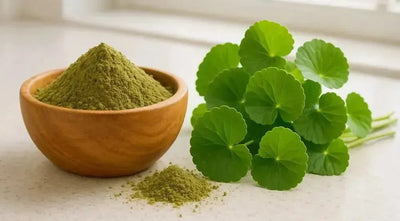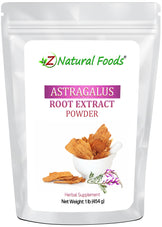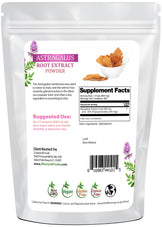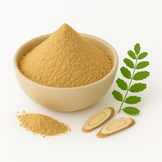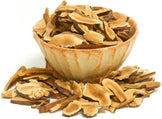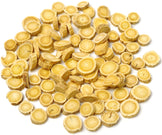Description
Description
Summary
|
Boost Recovery and Resilience Naturally with Astragalus
A king in the world of tonic herbs, Astragalus is one of Traditional Chinese Medicine's most revered Qi tonics and is essential for anyone looking to elevate their health or athletic performance.
This potent tonic is well-known to stand toe-to-toe with some of TCM’s major tonic herbs like Reishi mushrooms, Goji berries, He Shou Wu, Schizandra berries, Eucommia, Ginseng, and Gynostemma.
Astragalus is considered one of the top 50 foundational herbs in TCM, and in parts of China, it is called little ginseng for its Qi-moving qualities. In fact, Astragalus’s name, Huang Qi, literally translates to yellow leader, which signifies its role as a top TCM tonic herb.
How Astragalus may support recovery and the ability to adapt and become more resilient
In today’s article, we explore how Astragalus may support recovery and the ability to adapt and become more resilient. However, before I discuss this information, it is essential to understand some of the foundational principles of Traditional Chinese Tonic Herbalism.
Tonic herbs are defined based on function and criteria. In simple terms, four primary fundamental aspects define a tonic herb:
- They create and support physical, mental, and emotional well-being through the appropriate balance of Yin and Yang energy to attain vibrant health.
- They can be used for an unlimited period with no adverse effects.
- No matter how long an individual uses tonic herbs, they never build a tolerance.
- True tonics come from their authentic source and spiritual homeland. This principle is known in Daoist herbalism as Di Tao. Di Tao refers to the specific region or area where a herb is traditionally grown and harvested, and it makes a vital difference in potency and efficacy. The unique climate, soil, and other environmental factors of the Di Tao region contribute to the herb's quality and effectiveness.
All tonic herbs nourish at least one of what TCM calls The Three Treasures. The three treasures are interconnected and contribute to overall health and well-being. They are as follows:
- Jing is essence primarily stored in the kidneys. Jing is one’s constitution, regulates growth and development, and works with Qi to protect the body from harmful external conditions. Poor constitution, blood loss, and excessive sexual activity can cause jing essence deficiencies.
- Qi is a life force or vital energy stored in the kidneys. Both the physical and emotional are manifested as Qi. One is inherited from our parents, and the second is derived from essential substances like air, food, and water. Deficiencies are caused by poor nutrition and digestion, chronic stress, and constrained breathing.
- Shen is the emotional and spiritual layer of our being that reflects the state of our nervous system. Shen lives in the heart and is said to “preside over the activities that take place in the spiritual and mental planes.” Because Shen lives in the heart, people with disturbed Shen may experience anxiety, stress, difficulty breathing, and insomnia. In such cases, the primary weakness is from the spleen, which cannot generate enough blood to nourish the heart and anchor the Shen.
TCM takes a comprehensive approach to health, categorizing tonic herbs into four primary categories: Qi Tonics, Blood Tonics, Yin Tonics, and Yang Tonics. This comprehensive approach ensures that all aspects of health and well-being are addressed.
- Qi Tonics
- Blood Tonics
- Yin Tonics
- Yang Tonics
Next, let's take a look at the effects of Astragalus according to TCM.
Astragalus is a major Qi Tonic known as the “Great Protector of Qi” because it fortifies protective Qi, which flows just under the skin and in the muscles.
- In traditional Chinese medicine, the innate immune system is linked to a concept called Wei Qi, which is the body’s defense energy.
- This “surface energy” supports the opening and closing of pores, our first line of defense against external environmental changes.
- In Chinese medicine, the term dampness describes conditions in which an individual cannot properly metabolize fluids.
- Astragalus is slightly warming with strong supportive qualities for the spleen and lungs (2 organs specific to fluid metabolism) and is known to support “fluid metabolism.”
- As a “Double-Directional Adaptogen,” it may also support good posture and tonify organs in the abdominal and pelvic cavity.
- It is well known for its strengthening effects on the outside of the body, specifically on the musculature.
- Astragalus is traditionally used to strengthen the legs and arms, and is commonly used by those who work in cold environments because it is known to strengthen and warm.
For clarity, when we refer to Astragalus as an “adaptogen,” it is based on TCM’s principle definition. According to TCM, all Qi tonics are considered adaptogens. However, not all adaptogens are Qi tonics.
Now, let’s take a look at Western medicine's perspective on Astragalus.
To understand the Western medicine perspective on Astragalus, it is essential to discuss one of its primary components: polysaccharides.
In simple terms, Polysaccharides are large carbohydrate molecules containing many small sugar molecules (monosaccharides) bonded by a glycosidic linkage (a type of bond that joins a carbohydrate molecule to another group). They are the most abundant carbohydrate found in food. Polysaccharides consist of more than ten monosaccharide units linked together.
Polysaccharides form when monosaccharides and disaccharides link together (resulting from a dehydration process). The sugars participating in this bond are called residues. It is believed that Polysaccharides isolated from astragalus produce immunomodulating effects via activation of toll-like receptor 4 (TLR4)-related mitogen-activated protein kinase (MAPK) activities.
In simple terms, this process represents the first line of defense against infection.
The following was stated in a review discussing the Pharmacological Action of Astragalus polysaccharides:
- The main components of A. membranaceus are Astragalus polysaccharide (APS), flavonoid compounds, saponins, and alkaloids.
- APS, the most critical naturally active component in A. membranaceus, possesses multiple pharmacological properties.
- APS has the vast potential to develop a drug that improves or treats different diseases.
The influences of Astragalus Polysaccharides on the immune system provide a tonifying and balancing response. Dendritic cells (DCs) are key in activating the immune response, and APS facilitates their growth and maturation.
- It supports the increased proliferation and differentiation of B and T lymphocytes, a replication process necessary to fight infection.
- Regulating the balance in the T lymphocyte subgroup- a process that prevents autoimmunity and chronic inflammation.
- Regulating natural killer cells and macrophages is crucial, as this interaction forms the first line of defense against pathogens.
Furthermore, APS exerts different effects on cytokines under various conditions.
- Under normal physiological conditions, it can promote cytokine production and enhance immunity.
- However, APS can reduce inflammatory response factors and protect cells or the body after cytokines increase due to an inflammatory response.
In simple terms, Astragalus has the ability to modulate the immune response.
Putting it all together.
When we look to discuss how an herb or food affects recovery and builds resilience, what better example is there than athletes?
The following was stated in a randomized controlled study looking at the effects of standardized Astragalus extract on reducing the immunosuppressant impact of strenuous exercise.
- The participants performed a 2000 m test on a rowing ergometer at the beginning and at the end of a six-week intensive training camp, during which the supplemented group received 500 mg of AMR.
- Blood samples were obtained before, 1 min after completing, and 24 h after the exertion test.
- The levels of interleukin 2 (IL2), interleukin 4 (IL4), interleukin 10 (IL10), interferon ɤ (IFN-ɣ), and lactic acid were determined.
- Subpopulations of T regulatory lymphocytes (Treg), cytotoxic lymphocytes (CTL), natural killer cells (NK), and TCRδγ-positive cells (Tδγ) were determined with flow cytometry.
The following was determined after the training camp.
- The initial NK and Treg levels were sustained at the baseline, while Tδγ counts increased relative to the levels in the placebo group.
- In the supplemented subgroup, a decrease in IL-2 level in response to maximal exertion was more pronounced.
- In contrast, the change in IL-2/IL-10 level induced by recovery after this exertion clearly increased, relative to the changes in the placebo group.
Therefore, it was concluded that Astragalus Membranaceus Root restored the immunological balance in strenuously trained athletes through a stabilization of NK and Treg cells with a positive trend in Tδγ towards Th1 response during restitution by cytokine IL2 modulation.
What is Resilience & How is it built?
To begin, it is essential to understand that resilience is not an inherent trait. It is not a fixed characteristic but instead, a skill that is learned and developed over time. Building resiliency is not meant to be achieved all at once; it is built in layers by consistently challenging yourself through various tasks that challenge you physically, mentally, and socially.
- Actively build and maintain strong, positive relationships.
- Work to see difficult situations from new perspectives; focus on what you can control. You would be surprised at what you can control when you push hard enough.
- Establish clear goals and take manageable steps towards them.
- Don’t be an apologizer, be a problem solver.
- Reflect
- Accept change
Consistency is King
If you dip into our archives, you will find an article I wrote discussing whether athletes should take adaptogens before and after their training. In that article, I discuss how evidence suggests that within 30 minutes of single-dose administration of the adaptogen Rhodiola, there is a 4-6 hour increase in mental performance and physical work capacity, but no particular correlation to better recovery of that workout. Because Rhodiola is a stimulating adaptogen, these specific effects come as no surprise.
However, while this small amount of evidence shows some unique potential of specific adaptogens, neither Astragalus nor any other tonic or adaptogen is most effective in single-dose administration. Astragalus is primarily a restorative Qi (energy) tonic, and its effects build over time. Therefore, it is essential to understand that while there is plenty of evidence showing positive impacts and acute physiological responses to a single-dose or short-term administration of Astragalus root extract, the profound effects are cumulative. Essentially, you are building layers of protection and resilience.
While the immune-modulating effects of Astragalus are often credited for its effectiveness in supporting recovery and building resilience, I believe its impact on the spleen and stomach, based on TCM principles, is the true unsung hero behind its support for recovery and resilience. Astragalus’s yellow color emphasizes its importance as a potent Qi tonic (much like another potent Qi tonic, Ginseng), often linked to the earth elements, the spleen, and stomach, and represents balance, nourishment, energy, and warmth. However, its most important relevance is that it represents vitality and harmony.
In Traditional Chinese Medicine (TCM),
- The Spleen and Stomach are critical for digestion.
- They work together to transform food into usable Qi and Blood.
- The Stomach receives and digests food, while the Spleen governs the transport and transformation of nutrients, separating the pure from the impure.
- Imbalances in the Spleen and Stomach can lead to various health issues, including digestive problems, fatigue, and even emotional imbalances.
- The stomach is a yang organ that is associated with activity, heat, and transformation. The spleen is a yin organ associated with being calm, passive, and substantial.
It is the above reasons and effects that astragalus has on digestive health from a TCM perspective that really make it a superstar when supporting recovery and building resilience. It is no secret that your gut health, ability to digest, absorb, and utilize what you consume, is the most essential key to growth and recovery.
In conclusion, both traditional Chinese and Western herbal medicine agree that Astragalus root extract is best used as a long-term daily tonic to nourish and support a strong, healthy immune system, support recovery, and build resilience. Like many tonics from all forms of herbal medicine, long-term use leads to cumulative effects that build layers that, over time, create a stronger and more resilient YOU.
For more information about our Astragalus Root Extract Powder, go here:
Astragalus Root Extract Powder
The Author’s Bio
Michael Stuchiner is a Master Herbalist and proud graduate of The School of Natural Healing, with over 25 years of experience in various aspects of the field. He is a retired elite-level powerlifter who competed for 27 years. As an avid international traveler, he is passionate about the use of medicinal and tonic herbs, as well as foods traditionally found in local markets in the 35 countries he has visited. Michael shares his years of experience as a Master Herbalist, traveler, and athlete through the hundreds of articles he has written and his YouTube channel, "A Master Herbalist Perspective." He is considered a true educator in this field. He is considered a true educator in this field. For more articles written by Mike, go here: Master Herbalist.
